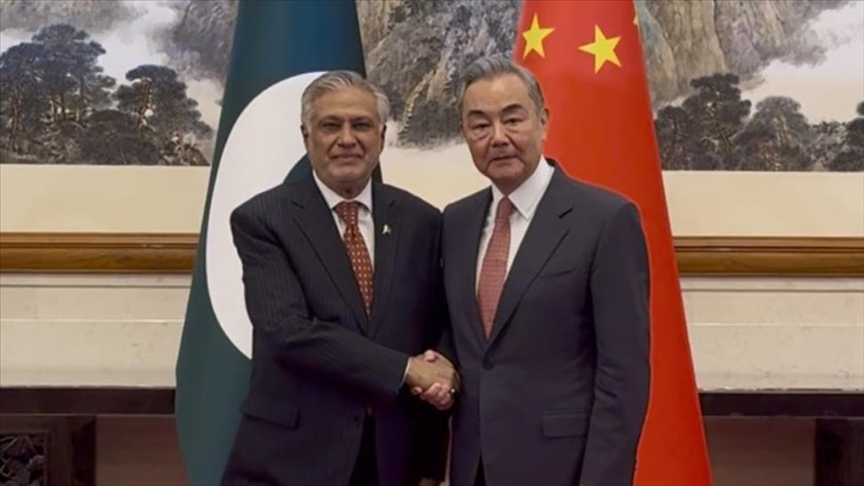China reiterates firm support for Pakistan in defending its territorial integrity, national sovereignty
China's statement comes after meeting between Chinese Foreign Minister Wang Yi and his visiting Pakistani counterpart Ishaq Dar in Beijing
 Photo Source: X, @ForeignOfficePk
Photo Source: X, @ForeignOfficePk
KARACHI, Pakistan
China on Tuesday reiterated its "firm" support for Pakistan in defending its territorial integrity and national sovereignty in the wake of Islamabad's latest military standoff and deadly fights with India.
China's statement came after a meeting between Chinese Foreign Minister Wang Yi and his visiting Pakistani counterpart Ishaq Dar in Beijing, according to statements from the two countries' foreign ministries.
"As a staunch friend, China will, as always, firmly support Pakistan in safeguarding its national sovereignty and territorial integrity, support Pakistan in exploring a development path that suits its national conditions, (and) support Pakistan in resolutely combating terrorism," said Wang, according to a Chinese Foreign Ministry statement.
The two sides, the statement added, should work together to develop an "upgraded version" of the multibillion-dollar China-Pakistan Economic Corridor (CPEC) project, as well as promote cooperation in the fields of industry, agriculture, energy and mining, human resources development, counterterrorism, and security.
Dar, for his part, updated Wang on the latest developments since Pakistan and India reached a ceasefire agreement following a five-day military conflict earlier this month.
He thanked China for "upholding justice and making unremitting efforts and significant contributions to the ceasefire and peace promotion."
"Pakistan will firmly safeguard its national sovereignty and territorial integrity, and at the same time is willing to maintain dialogue with India to ease the situation," Dar said.
He added that Pakistan supports China in safeguarding its national interests and dignity, in addition to adhering to the one-China principle.
In response, Wang said China welcomes and supports Pakistan and India in "properly handling their differences through dialogue, achieving a comprehensive and lasting ceasefire, and seeking a fundamental solution, which is in line with the fundamental and long-term interests of both sides, conducive to regional peace and stability, and also the general expectation of the international community."
The latest military escalation began between two nuclear neighbors on May 6, when India fired missiles inside Pakistan and Pakistan-administered Kashmir, hitting what New Delhi said were "nine terror locations," triggering retaliation on May 10 by Islamabad, which hit 26 Indian military targets inside its eastern neighbor as well as in Indian-administered Kashmir.
But the US mediated a ceasefire between the two nuclear-armed neighbors on May 10. The two rival militaries last week decided to continue “confidence-building measures to reduce alertness level.”
Following the April 22 attack by unidentified gunmen in Indian-administered Kashmir, which left 26 people dead and triggered the escalation, India unilaterally suspended the decades-old Indus Waters Treaty with Pakistan, which continues to remain in abeyance.
Islamabad said it shot down six Indian fighter jets during the conflict. There was no official reaction from India about Pakistan's statement.
Anadolu Agency website contains only a portion of the news stories offered to subscribers in the AA News Broadcasting System (HAS), and in summarized form. Please contact us for subscription options.







